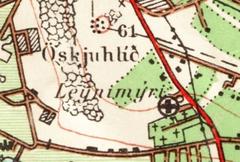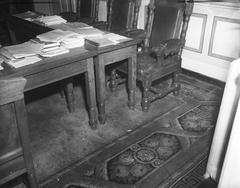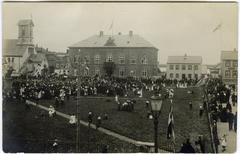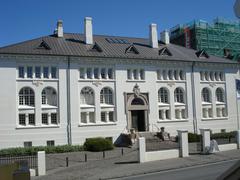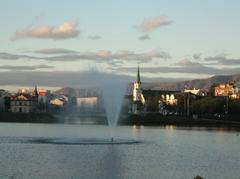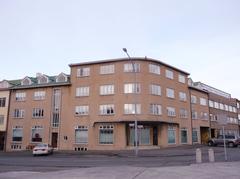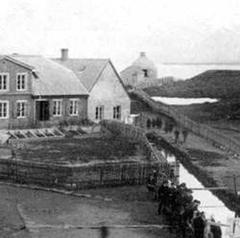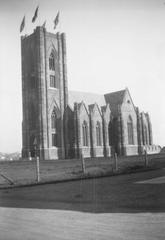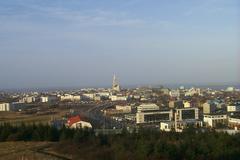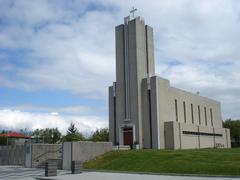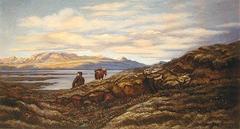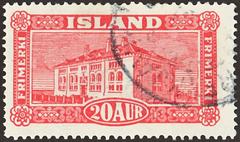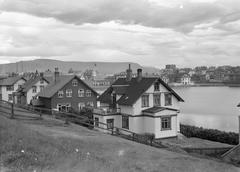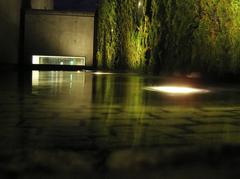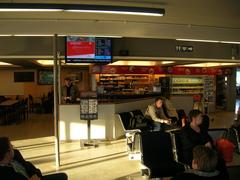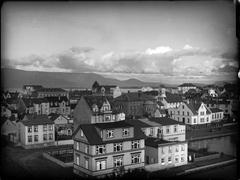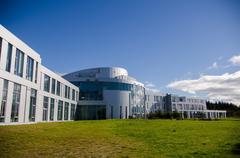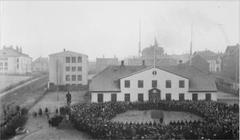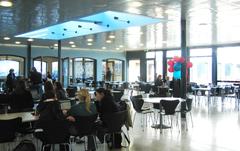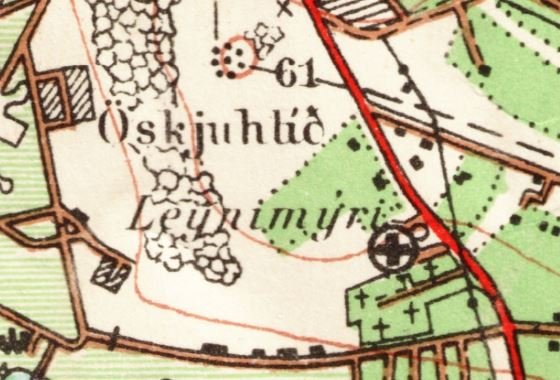
Visiting Öskjuhlíð Reykjavík Iceland: Guide, Visiting Hours, Tickets, and Tips
Date: 14/06/2025
Introduction
Öskjuhlíð, nestled in the heart of Reykjavík, stands as a unique convergence of Iceland’s volcanic heritage, wartime history, and contemporary urban culture. Rising 61 meters above sea level, this forested hill was sculpted by ancient eruptions and glacial activity. Today, it is celebrated both as an ecological haven and a historical landmark, crowned by Perlan—a glass-domed architectural marvel offering panoramic city views and immersive exhibitions. Whether you’re seeking scenic hikes, insights into Reykjavík’s past, or interactive experiences at Perlan, this comprehensive guide covers everything you need for a memorable visit, including hours, tickets, accessibility, nearby attractions, and must-know travel tips (nat.is; Perlan.is).
Table of Contents
- Öskjuhlíð Overview: History and Cultural Significance
- Geological Origins and Natural Features
- Strategic and Wartime Heritage
- Perlan: From Hot Water Tanks to Reykjavík Icon
- Visitor Information: Hours, Tickets, and Accessibility
- Nearby Attractions
- Recreation and Outdoor Activities
- Facilities and Amenities
- FAQs
- Summary & Final Recommendations
- Official Sources & Further Reading
Öskjuhlíð Overview: History and Cultural Significance
Öskjuhlíð is more than a city park—it is a living testament to Reykjavík’s evolution. Initially valued for its strategic vantage during World War II, the hill was later transformed through large-scale reforestation. Today, it is home to over 135 plant species and a rich array of birds, making it one of Reykjavík’s greenest urban spaces (Your Friend in Reykjavik). Perlan, the glass-domed landmark at the hill’s summit, reflects this blend of nature, history, and innovation. The site also hosts remnants of wartime bunkers and the Ásatrúarfélagið Temple, deepening its cultural resonance.
Geological Origins and Natural Features
Öskjuhlíð’s undulating contours were formed by ancient volcanic eruptions and later shaped by glacial processes during the last Ice Age. The area’s “Reykjavík grey basalt” is evidence of its fiery origins. A century ago, much of the hill was submerged, with sea levels 43 meters higher than today (nat.is). Reforestation in the 20th century introduced birch, pine, spruce, and aspen, creating a haven for local flora and fauna. The site is now recognized as an urban biodiversity hotspot, frequented by birdwatchers and nature enthusiasts.
Strategic and Wartime Heritage
During WWII, Öskjuhlíð was a critical military site. British forces established Reykjavík’s domestic airport and constructed bunkers, some of which are still visible today. These relics provide visitors with a tangible connection to Iceland’s wartime narrative and can be explored along marked trails (nat.is).
Perlan: From Hot Water Tanks to Reykjavík Icon
Origins and Transformation
Perlan (“The Pearl”) began as a series of hot water tanks built in 1939 to support Reykjavík’s burgeoning geothermal infrastructure (Guide to Iceland). In 1991, the tanks were capped with a glass dome, designed by architect Ingimundur Sveinsson, fulfilling artist Jóhannes Kjarval’s vision of an urban beacon reflecting Iceland’s light and landscape (Iceland Lovers). Today, Perlan houses interactive exhibitions, a revolving restaurant, and a 360° observation deck.
Highlights
- Wonders of Iceland Exhibitions: Interactive displays explore volcanoes, glaciers, bird cliffs, and ocean life; the ice cave exhibit uses 350 tons of real Icelandic snow (Perlan.is).
- Volcano Show: A multimedia film documents recent eruptions, including Fagradalsfjall (RVTV Blog).
- Northern Lights Planetarium: The Áróra show offers immersive journeys through aurora science and folklore (Perlan.is).
- Revolving Restaurant & Café: Dine with panoramic views; the restaurant completes a full rotation every two hours (Guide to Iceland).
Visitor Information: Hours, Tickets, and Accessibility
Visiting Hours
- Öskjuhlíð Trails: Open 24/7, year-round.
- Perlan: Typically open 10:00 AM–6:00 PM (winter), with extended summer hours; always check Perlan’s website for updates.
Tickets
- Öskjuhlíð Trails: Free access.
- Perlan: Exhibitions, planetarium, and observation deck require tickets (ISK 3,000–4,000 for adults; discounts for children, families, and seniors). Online purchase recommended, especially in peak season (Guide to Iceland).
Getting There
- On Foot/Bike: 30–40 min walk from city center, with well-marked trails and bike paths (Guide to Iceland).
- Public Transport: Buses 8, 13, and 18 stop nearby (Reykjavik.is).
- By Car: Ample free parking at Perlan and the base of the hill.
Accessibility
- Perlan: Fully wheelchair accessible (elevators, ramps, adapted restrooms).
- Trails: Main paths are accessible; some steeper sections may be challenging.
Travel Tips
- Dress in Layers: Icelandic weather is unpredictable.
- Photography: Observation deck and hilltop offer superb city and bay vistas.
- Family-Friendly: Perlan’s exhibits and the forested slopes are great for kids.
Nearby Attractions
- Nauthólsvík Geothermal Beach: Heated seawater and golden sand a short walk from Öskjuhlíð.
- Vatnsmýrin Nature Reserve: Adjacent wetlands, ideal for birdwatching.
- Reykjavík University & Downtown: Easily accessible via trails or public transport.
- Kjarvalsstaðir Art Museum & Klambratún Park: For art and outdoor enthusiasts.
Recreation and Outdoor Activities
- Hiking & Walking: Extensive trails wind through forests, WWII bunkers, and scenic lookouts (Town and Tourist).
- Cycling: Interconnected paths link Öskjuhlíð to the city’s biking network.
- Winter Sports: Sledding and cross-country skiing when snow permits.
- Picnicking: Benches and picnic tables are scattered throughout scenic spots.
Facilities and Amenities
- Perlan: Museum, exhibitions, planetarium, revolving restaurant, café, ice cream parlor, gift shop, free Wi-Fi (Perlan.is).
- Restrooms: Available at Perlan.
- Parking: Ample spaces, including accessible and bus parking.
- Outdoor Facilities: Marked trails, picnic areas, sports spaces, interpretive signage.
FAQs
Q: Are trails and Perlan open year-round?
A: Yes, the outdoor areas are open 24/7, and Perlan is open daily, with seasonal variations in hours.
Q: Is there an entrance fee for the hill?
A: No, Öskjuhlíð’s trails and outdoor areas are free. Perlan requires a ticket for exhibitions.
Q: Are guided tours available?
A: Yes, both for outdoor exploration and Perlan’s exhibitions (Guide to Iceland).
Q: Is Öskjuhlíð suitable for all ages and abilities?
A: Most main paths are accessible, and Perlan is fully wheelchair-friendly.
Q: Can I bring my dog?
A: Dogs are permitted if leashed to protect wildlife.
Q: Can I see the Northern Lights from Öskjuhlíð?
A: Yes—on clear winter nights, the hill offers excellent vantage points.
Summary & Final Recommendations
Öskjuhlíð encapsulates Reykjavík’s unique blend of nature, history, and innovation. Its volcanic past, WWII relics, and flourishing forest provide layers of discovery for visitors. Perlan, with its world-class exhibitions and city views, is a must-see highlight. Year-round accessibility, extensive recreational options, and proximity to other urban attractions make Öskjuhlíð an essential stop for travelers seeking the full Reykjavík experience. Plan ahead by checking opening hours, booking Perlan tickets online, and dressing for the weather. Embrace both the hill’s natural serenity and Perlan’s cultural energy for an unforgettable visit (nat.is, Perlan.is, Guide to Iceland).
Official Sources & Further Reading
- Öskjuhlíð Hiking Guide (nat.is)
- Perlan Official Website
- Nature Reserves and Parks in Reykjavík (Your Friend in Reykjavik)
- Öskjuhlíð Visitor Guide (Reykjavik.is)
- Reykjavík Tourism
- Guide to Iceland: Perlan
